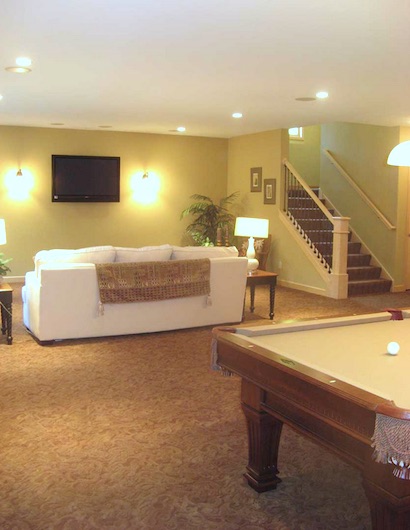
Finishing a basement is a popular home improvement project that promises to add both functional living space and increased value to your home. However, many homeowners wonder if the investment will truly pay off when it comes time to sell. This article explores the benefits, potential returns, and key considerations involved in finishing a basement, helping you make an informed decision about whether this renovation is right for you.
Benefits of Finishing Your Basement
- Increased Living Space
One of the most obvious benefits of finishing a basement is the additional living space it provides. This can be transformed into various functional areas, such as:- Family Room: A cozy place for family gatherings and entertainment.
- Home Office: Especially relevant in the age of remote work.
- Guest Suite: An extra bedroom and bathroom for visitors.
- Home Gym: A private space for exercise and wellness.
- Recreation Room: For hobbies, games, or a home theater.
- The versatility of a finished basement makes it a valuable addition to any home, accommodating various needs and lifestyles.
- Increased Home Value
Finishing a basement can significantly boost the value of your home. According to industry experts, homeowners can expect to recoup approximately 70-75% of the cost of a basement finish when they sell their home. This return on investment (ROI) can vary based on factors such as the quality of the finish, the functionality of the space, and the overall real estate market in your area. - Enhanced Appeal to Buyers
A well-finished basement can be a major selling point, making your home more attractive to potential buyers. Buyers often seek homes with additional living spaces that are move-in ready, and a finished basement can set your property apart from others on the market. - Improved Energy Efficiency
Finishing your basement can improve your home’s overall energy efficiency. Proper insulation and sealing can reduce drafts and heat loss, leading to lower energy bills. Additionally, modern basements often incorporate energy-efficient lighting and heating solutions. - Maximized Property Usage
An unfinished basement is often underutilized, serving as a storage space for items that are rarely used. By finishing your basement, you can maximize the usable square footage of your home, making it a more efficient and enjoyable living environment.
Factors to Consider Before Finishing Your Basement
- Cost
The cost of finishing a basement can vary widely depending on the size of the space, the quality of materials used, and the complexity of the design. On average, homeowners can expect to spend between $20,000 and $50,000 on a basement finishing project. It’s crucial to create a detailed budget and consider potential hidden costs, such as plumbing, electrical work, and moisture control. - Building Codes and Permits
Basement finishing projects must comply with local building codes and regulations. This often involves obtaining permits and undergoing inspections to ensure that the work meets safety standards. Failing to comply with these regulations can result in costly fines and may affect the resale value of your home. - Moisture and Waterproofing
Basements are prone to moisture issues, which can lead to mold and structural damage if not properly addressed. Prior to finishing your basement, it’s essential to implement effective waterproofing solutions, such as sump pumps, drainage systems, and vapor barriers, to protect your investment. - Design and Layout
Thoughtful design and layout are key to creating a functional and aesthetically pleasing finished basement. Consider factors such as natural light, ceiling height, and the placement of rooms to ensure the space meets your needs and preferences. Consulting with a professional designer or contractor can help you optimize the layout and avoid common pitfalls. - Return on Investment
While finishing a basement can add value to your home, it’s important to evaluate the potential ROI based on your local real estate market. Research comparable homes in your area to determine how much value a finished basement might add and whether the investment aligns with your financial goals.
Maximizing the Value of Your Finished Basement
To ensure you get the most value from your basement finishing project, consider the following tips:
- Quality Materials and Workmanship
Invest in high-quality materials and hire reputable contractors to ensure a professional finish. Cutting corners on materials or labor can lead to costly repairs and reduce the overall value of your investment. - Functionality and Flexibility
Design your finished basement with flexibility in mind. Choose a layout that can be easily adapted for different uses, such as converting a playroom into a home office or a guest suite into a rental unit. This versatility can make your home more appealing to a broader range of buyers. - Consistent Design
Ensure that the design and finishes of your basement are consistent with the rest of your home. A cohesive look enhances the overall appeal and makes the basement feel like a natural extension of the living space. - Energy Efficiency
Incorporate energy-efficient features, such as LED lighting, programmable thermostats, and high-efficiency HVAC systems. These upgrades not only reduce energy costs but also appeal to environmentally conscious buyers. - Legal Compliance
Adhere to all building codes and regulations to ensure the safety and legality of your finished basement. This includes proper egress windows, smoke detectors, and adequate ventilation. Legal compliance enhances the value and marketability of your home.
Frequently Asked Questions
- How long does it take to finish a basement?
The timeline for finishing a basement can vary depending on the scope of the project, the complexity of the design, and the availability of materials and labor. On average, a basement finishing project can take between six weeks to three months from start to finish. It’s essential to discuss the timeline with your contractor and account for any potential delays. - Will finishing my basement increase my property taxes?
Finishing your basement can potentially increase your property taxes, as it adds to the overall square footage and value of your home. The exact increase depends on local tax assessment policies and the extent of the improvements. It’s advisable to consult with a local tax assessor or real estate professional to understand how finishing your basement might impact your property taxes. - Can I finish my basement myself, or should I hire a professional?
While some homeowners with DIY skills might choose to tackle parts of a basement finishing project themselves, hiring a professional contractor is generally recommended. Professionals have the expertise to ensure that the work is done correctly, safely, and in compliance with building codes. Additionally, a professionally finished basement is likely to yield a higher return on investment and appeal to potential buyers.
Conclusion
Finishing your basement is a substantial home improvement project that offers numerous benefits, including increased living space, enhanced home value, and improved energy efficiency. However, it’s essential to carefully consider the costs, design, and potential return on investment before embarking on this renovation. By planning meticulously and prioritizing quality, you can create a finished basement that not only meets your needs but also adds significant value to your home.
For more information or to get started on your basement finishing project, contact Total Home Remodeling today. Our team of experienced professionals is ready to help you transform your basement into a beautiful, functional space that enhances your home’s value and appeal.

